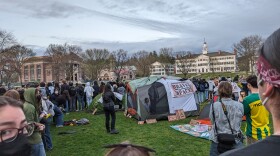Researchers at the University of New Hampshire are studying how spending time outdoors might help people who are struggling with substance use disorders.
It's called outdoor behavioral therapy. Morning Edition Host Rick Ganley spoke with Michael Gass, a professor and the current director of the Outdoor Behavioral Healthcare Center at UNH.
(Editor's note: this transcript has been edited lightly for clarity.)
First, what does an outdoor behavioral therapy program look like?
It generally consists of extended backcountry travel and wilderness living long enough to allow for clinical assessment, establishment of treatment goals, and a reasonable course of treatment for the issue facing the client. Generally speaking it's a group of nine clients and three mental health professionals.
Are the people participating suffering from similar disorders?
There is a collection of disorders. Generally speaking most of them have three or more presenting clinical issues. Generally speaking our clients are suffering from depression, anxiety, substance abuse and then possibly some other issues.
Have they gone through more conventional therapies before they've come to outdoor behavioral therapy?
Traditionally yes, they've tried everything and quite often we have parents say this is kind of a last resort that they're using.
So when you say parents, is this primarily younger people?
Yes, we have to kind of intact groups that we work with. One [is] adolescents from 13 to 19 and then there are young adults that range from 18 to 28.
Can you talk about some of the differences that you found when people receive treatment through this immersive wilderness experience versus a more traditional treatment setting in say a rehab facility?
In traditional therapy we talk the talk, and in outdoor behavioral healthcare we walk and talk the talk. So treatment is focused not only on the discussion of therapeutic issues, but actually to use the wilderness as a healing agent as well as a consequential one for them to explore newer behaviors that are more healthy for them.
But what were some of those behaviors be?
Well like for example, it can go down to a point where a lot of the clients that come are noncompliant towards therapeutic interventions.
They don't want to be in it in other words?
Right, they don't want to be there. This is not my problem. It's your problem. I'm doing fine. So in many ways those activities have the client become responsible for their actions. So if they don't set up their tent correctly and it rains, they get wet. And if they don't bring their boots in from outside to inside the tent during the rainstorm, then they're hiking in wet boots.
Well what are the completion rates for outdoor behavioral therapy look like when you compare [them] to traditional practices?
Well actually, they're quite high. We've examined completion rates of treatment, which is one of the best predictors of successful therapy, and 94 percent of the individuals who start [outdoor behavioral therapy] programs finish them. And the average of other opportunities ranges from 40 to 70 percent.
Is this is something that insurers can cover?
That's one of the things we're working on right now is we're working with insurance companies to try and make sure that we meet the clinical criteria that they expect programs to have, such as traditional cognitive behavioral healthcare. And so you've struck a chord. There is a major focus of the programs right now.
Is this kind of thing where you're hoping that becomes much more mainstream?
That's the hope is that we find practices and we continue to demonstrate through our research the effectiveness and the lasting effects of these programs, and we can show families what types of children may be best served by this.








